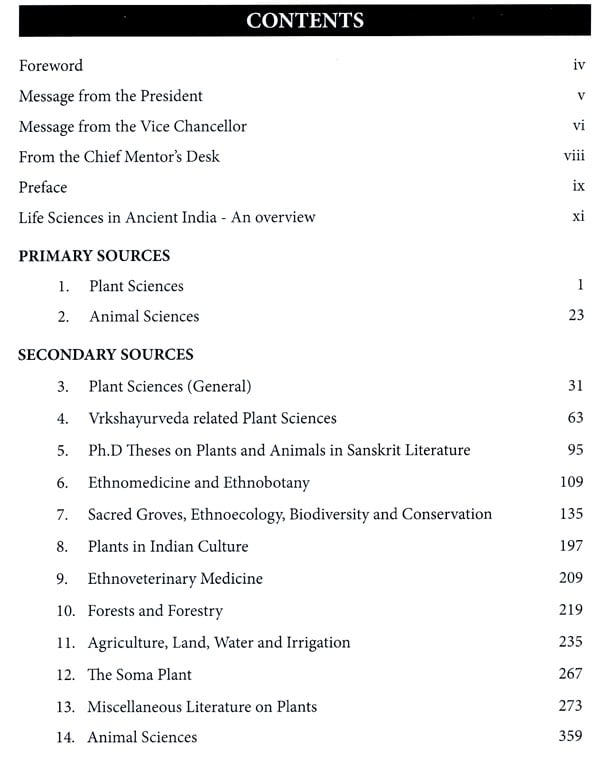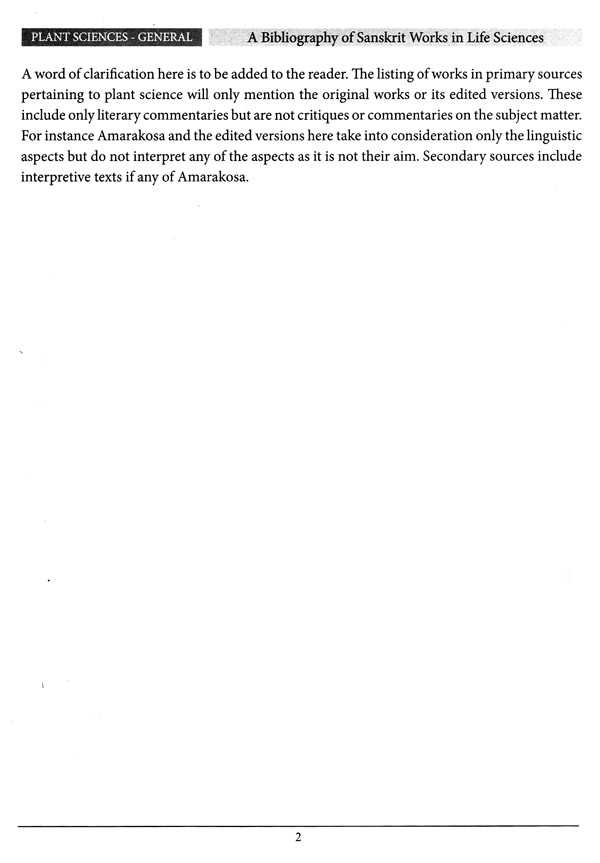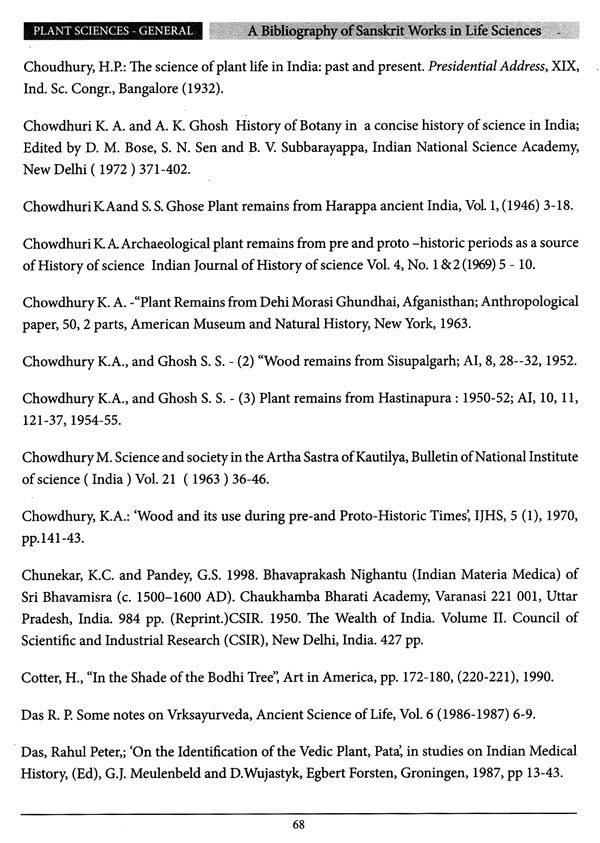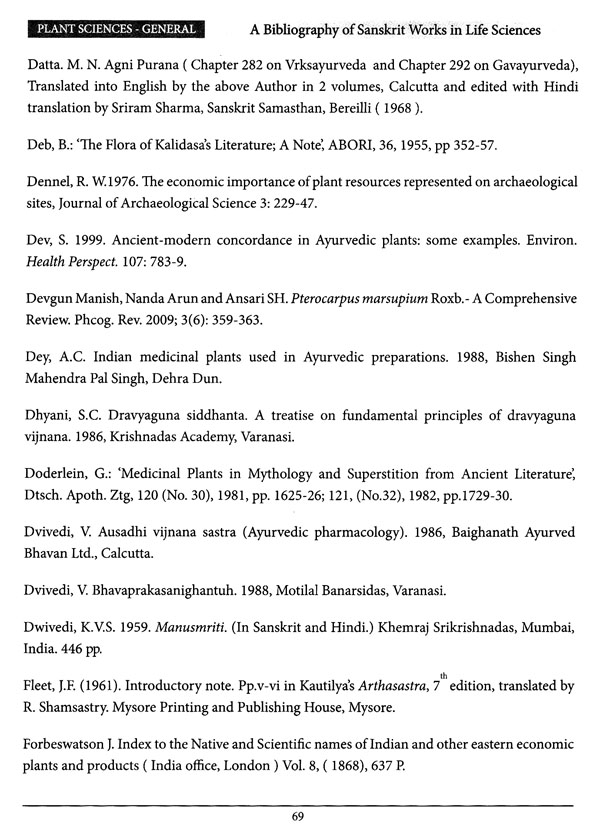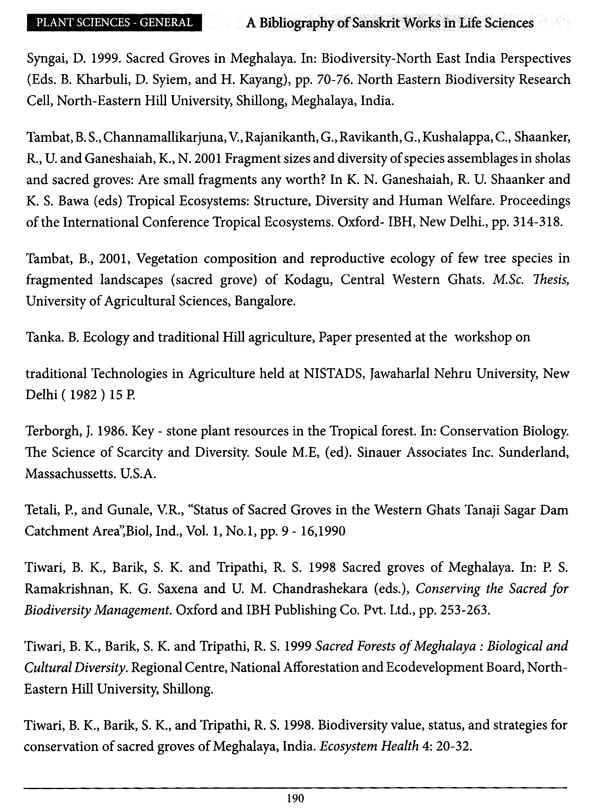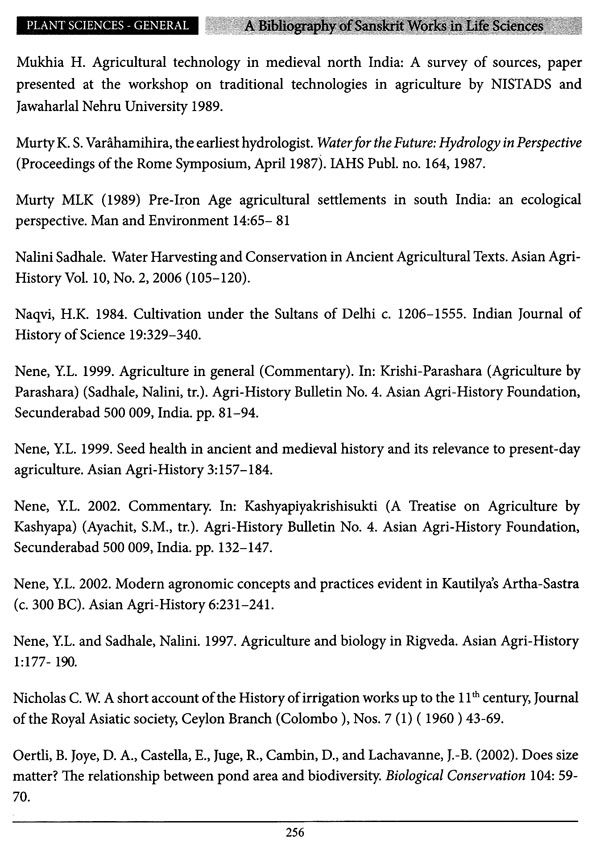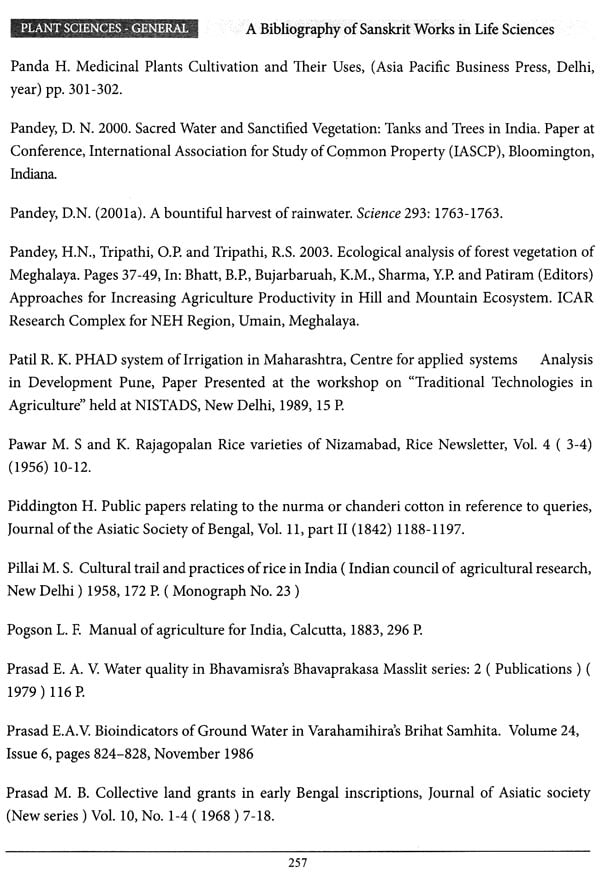
A Bibliography of Sanskrit Works in life Sciences
Book Specification
| Item Code: | NAU393 |
| Author: | S. Sundara Rajan |
| Publisher: | Jain University Press |
| Language: | English |
| Edition: | 2015 |
| ISBN: | 9788192099286 |
| Pages: | 427 |
| Cover: | HARDCOVER |
| Other Details | 10.00 X 7.50 inch |
| Weight | 1 kg |
Book Description
Bibliography of Sanskrit Works in Life sciences is a compilation of primary and secondary source materials from various literary works like research papers, books, monographs, dissertations, sanskrit manuscripts etc. The book encompassing more than 3000 references is not an omnibus collection, instead it is divided into 14 well thought out categories, so that focused researchers on individual themes will be able to locate them easily. The bibliography is broadly divided into animal and plant sciences with further sub divisions into primary and secondary sources. While primary sources reflect the original works with their literary editions, secondary sources on the other hand are biological and thematic interpretive studies of Sanskrit texts. Secondary sources on plant sciences are categorized into eleven sections covering such areas as Vrkshayurveda, biodiversity, forestry, Ethnobotany etc. In some instances modern references are also given for purposes of comparison. The book begins with a general overview of ancient Indian life sciences to familiarize the reader with the development of the subject in the Indian context. In addition, each chapter also has a brief introduction. The primary aim of this book is to serve as a ready reckoner for researchers in ancient Indian life sciences.
Dr. S. Sundara Rajan obtained a D.Sc. degree in Botany from the University of Mysore, specializing in plant chemistry, population Genetics and Genecology. He has been conducting Research in both botany and microbiology. Dr. S. Sundara Rajan also obtained a DLitt, degree from Tumkur University for his Thesis Glimpses of Plant Science from Sanskrit Literature. He has worked as Prof and Head of P.G. Dept of Botany St. Josephs College, Bangalore for nearly 38 years. After retirement he worked in several institutions and now has established a Personal Research Lab, Centre for Research in Ancient and Modern Biology (CRAMB) to continue his research activities. Dr. Sundara Rajans research interests include Plant Morphology, Physiology, Genetics and Evolution. He has published over 100 research papers in National and International Journals and has authored more than 95 books on Biological Sciences including Microbiology published by leading publishers of India. Dr. Sundara Rajan has travelled abroad widely and has presented papers in many International conferences. He has contributed several invited articles to many books and encyclopaedias and has done extensive research on History of Botany in Ancient India on which he has published a number of papers. He has also published two books on Ancient Indian Botany- Vedic Botany and Dictionary of Sanskrit plant names with botanical equivalents. Dr. Sundara Rajan has received many fellowships and research awards including gold medal by International Environmental Research Academy. He has also received state award by Government of Karnataka for being the best college teacher in 1997.
In Indian integrated vision of life, the plant kingdom has a distinct and honoured position- -in agriculture, medicine, environment and religio-cultural milieu-a vision and very long tradition that continues to be a part of our life even today. The scientific manuscript-wealth in Sanskrit, an impressive broad spectrum, includes many primary sources relating to plant science in its several aspects. While a considerable number of primary sources in respect of astronomy, mathematics, medicine and chemical practices have been studied by several scholars, both Indian and foreign, there are only a few competent scholars who have examined scientifically the relevant sources dealing with plant science. Dr S.Sundara Rajan has been a rare scholar who, with his expertise in modern botany as well as Sanskrit, has brought to light the various facets of Indian Botany in ancient period. Decades of his devoted studies and associated erudition have naturally led him to this enchanting publication which presents a scientific perspective on Indian botanical knowledge- -a comprehensive bibliography as well as source- book including the primary and secondary sources. In its 14 Sections encompassing, besides others, such important areas as Sacred Groves, Plants in Indian Culture, Forestry, Agriculture and Ethno-Botany. this fascinating book has nearly 3000 references-both primary and secondary—which is of great value to all those interested in researches in Indian plant science. The author's incisive Introductory Over-View has added a veneer of excellence to the understanding and scientific appreciation of Indian Botany. Historians of science in general and of plant science in particular, are indebted to Professor Sundara Rajan for his erudite publication which will surely energise further studies on Plant Science in India.
I am happy to note that the copies of the first edition of the book were sold out in 2012 itself, the year of first publication and I am thankful to the readers for this. This is the second edition, revised and enlarged. I was working on a research assignment at Jain University when the first edition got published. I have now established a personal research lab, Centre for Research in Ancient and Modem Biology (CRAMB) to continue with my research studies. The second edition of the book has been thoroughly revised with an exhaustive introduction. Many new original photographs have been added. I am thankful to Dr. B.E. Ravishankar for the photos. I am also thankful to Dr. N. Sundararajan Vice Chancellor, Jain University and to Prof Shantamani, Chief Mentor for all the encouragement bestowed on me when I was with them. I am highly thankful to Jain University Press for bringing out the Revised Edition. I am thankful to Dr. Sujan Ganapathy and all my colleagues at CASB, Jain University for their cooperation when I was working with them.
**Contents and Sample Pages**
